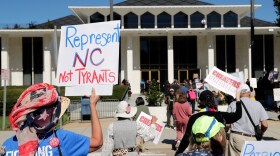North Carolina senators voted on Monday night to override Gov. Pat McCrory’s veto of a bill that would allow some court officials to opt out of same-sex marriage duties based on “sincerely held religious” objections.
The Senate, in a largely party-line vote of 32 to 16, confirmed its support to give magistrates the option, although they would be required to stop performing all marriage duties.
Senate Bill 2 was introduced in January by Senate Leader Phil Berger, arguably the state’s most influential elected official, after federal court orders legalized gay marriage in North Carolina last October, and about a half dozen magistrates resigned. An override would require approval from the House of Representatives, which Speaker Tim Moore said would debate the motion on Wednesday.
During Senate debate, Berger pointed to out-of state court cases that required local governments to provide accommodations to employees who objected to sections of their job based on religious reasons. In Illinois, a police department re-assigned a police officer who objected to being posted at an abortion clinic, and in Oregon, a local court was required to allow a clerk to not officiate at civil unions, Berger said.
“If someone takes a job, they do not park their First Amendment rights at the door, and they are entitled to continue to exercise those rights,” Berger said.
Bill supporters say all gay couples will still be able to get married because it would require the chief District Court judge in each county to arrange for marriage service for at least 10 hours over three days every week. But Democratic critics say it legalizes discrimination because it opens the possibility for a straight couple to receive service and a gay couple to be turned away.
In his veto message, McCrory told lawmakers that his “sincerely held” religious belief is that a marriage is an union between a man and a woman.
“However, we are a nation and a state of laws,” McCrory wrote. “Whether it is the president, governor, mayor, a law enforcement officer, or magistrate, no public official who voluntarily swears to support and defend the constitution and to discharge all duties of their office should be exempt from upholding that oath.”
It’s unclear whether enough members of the House of Representatives support the bill to vote to override the governor’s veto. The chamber’s last vote on the bill – 67 to 43 – would have surpassed the required threshold of three-fifths of voting members to approve the override, but the 10 members absent from that vote could potentially swing the outcome.
It is likely the bill, if it were to become law, would be taken in court. Luke Largess, a Charlotte-based attorney who challenged North Carolina’s 2012 constitutional amendment that defined a marriage as a union between a man and a woman, said the law would demean certain segments of the population.
“If this bill becomes law, it will invite a new round of court challenges,” Largess said.







